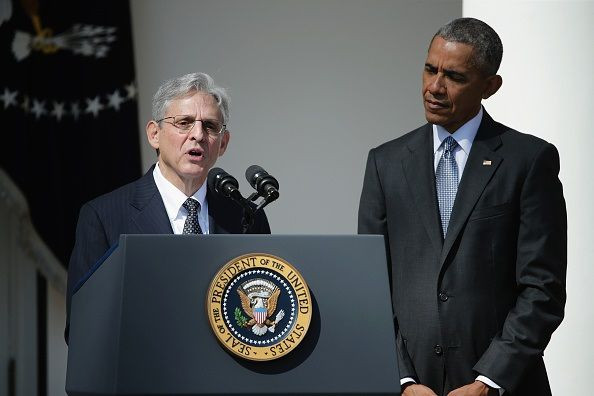Obama Supreme Court Pick Garland Viewed As Friend Of Government Regulators

Supreme Court nominee Merrick Garland has been sympathetic to government regulators in his almost two decades as an appeals court judge, frequently rejecting business-led challenges to federal action.
His overall record, however, suggests he is a moderate who follows Supreme Court precedent and is not eager to spearhead efforts to adopt novel legal theories.
Garland sits on the U.S. Court of Appeals for the District of Columbia Circuit, which hears a large proportion of the legal challenges to major federal regulations in areas such as environment and labor.
They are often brought by business groups like the U.S. Chamber of Commerce. Cases are assigned randomly to three-judge panels. Garland has avoided some of the most contentious cases of recent years, including challenges to government efforts under President Barack Obama to curb carbon emissions and ensure equal access to Internet data via its so called "net neutrality" rule.
Of the cases in which he has participated, some of his opinions and votes in his 19 years on the bench have already attracted criticism from conservative and pro-business groups following his nomination to the high court by Obama on Wednesday. They say he too easily defers to government action.
"We have great concerns about this nominee's record," said Juanita Duggan, president of the National Federation of Independent Business, which represents small business owners.
The group cites several cases, including one from 2003 in which the appeals court ruled against a developer challenging a finding the federal government had authority to force it to take measures to protect an endangered toad on the property under the federal Endangered Species Act.
The ruling, written by Garland, was a win for the administration of Republican President George W. Bush, which was defending the actions of the U.S. Fish and Wildlife Service. Garland wrote a narrow decision, saying he was merely staying in line with court precedent.
One of the judges on the appeals court who disagreed with the outcome was John Roberts, who Bush appointed as Chief Justice of the Supreme Court in 2005. Roberts questioned whether the federal government had the authority to issue regulations protecting what he described as "a hapless toad." Roberts' opinion was questioned by liberals when he was nominated to the high court as a sign that he would limit federal power to issue broad nationwide regulations.
In another case mentioned by the business group, Garland was part of a three-judge panel that in 1998 upheld Environmental Protection Agency emissions limits for nitrogen oxides from electric utility boilers.
More recently, he was on a panel in 2014 that upheld an Obama administration air pollution rule that limits emissions of mercury and other toxic pollutants. The court held that the government was not required to consider the cost of compliance before issuing the regulation. The Supreme Court in June 2015 threw out that decision, although the regulation remains in place.
In another 2014 case, he was part of a panel of 11 judges that ruled 8-3 to reject a food industry challenge to a federal rule concerning labeling requirements for meat.
Despite those votes in favor of the government and against business interests, Garland is seen by legal experts as a moderate on the appeals court.
"He’s a modest judge in that he really does try to stick to Supreme Court precedent," said Jonathan Adler, a professor at Case Western Reserve University School of Law. Adler said Garland was somewhere in the middle of the 17-judge court when it comes to deference to agency action.
Appeals court judges' hands are somewhat tied on regulatory cases because they are bound by Supreme Court precedent that favors deference to government agencies. In 1984, the high court ruled that judges should not second-guess agencies if the law is ambiguous.
Neal Katyal, a former Obama administration lawyer now in private practice with the Hogan Lovells law firm, said it is a "really tough argument" to suggest Garland's rulings on regulations show an ideological leaning. He described Garland's record on such cases as "very, very centrist."
The Chamber of Commerce and the National Association of Manufacturers, another industry group that regularly fights government regulations, said they would not comment on the merits of Garland's nomination.
© Copyright Thomson Reuters 2024. All rights reserved.





















